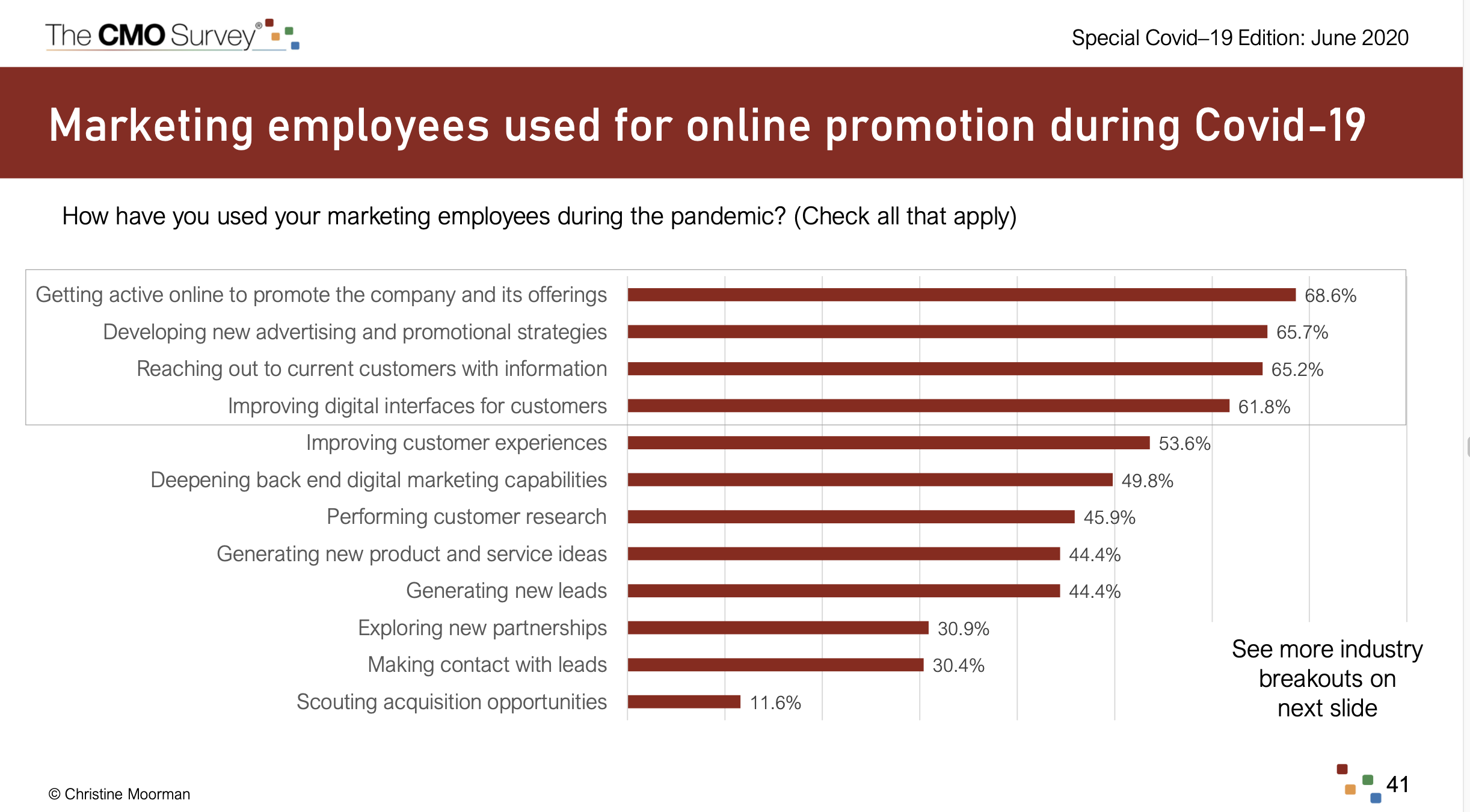
Many, if not most, or all, are familiar with The CMO Survey. Their mission is to “collect and disseminate the opinions of top marketers in order to predict the future of markets, track marketing excellence, and improve the value of marketing in firms and in society.”
Recently they released a special edition of the survey to provide the marketing profession with an understanding of how marketing activities, spending, jobs, and performance have been influenced by the upheavals of the past three months. It’s titled Covid-19 and the State of Marketing and you can download it here.
There’s a host of interesting and intriguing results via their research. I am a big fan of research and stats as you know and this is no different. I have to say I am not crazy about the parts of the survey where they ask marketers to think like customers and answer questions as to how a customer MIGHT think.
Hey, it’s just like Marvin Gaye & Tammi Terrell sang, Ain’t Nothing Like the Real Thing. Translation: When you want to know what customers really think, ask them. So I take results like these — where a marketer is asked to assume what a customer would say — with a grain of salt to say the least
Fatal Mistake
Of course, I do like to hear what marketers themselves are thinking and doing and so on. And it is one of these types of findings I believe is a fatal mistake being made by CMOs during COVID or quite frankly… anytime.
Here’s the chart/finding that, the second I read it, knew was a fatal mistake.

Do you see it? You don’t have to look far. It’s right at the top of the list.
“Nearly 70% of respondents say they are using employees to promote the company and its offerings.”
Look, I get it. Budgets are being slashed (one of the findings). So CMOs are dealing with, in some cases, significantly less money to play with; to promote; to market. I get it. Believe me, I get it. But to ask employees to serve as de-facto brand spokespeople is an absolute horrible idea of epic proportions.
A little too heavy on the hyperbole spice there, Steve?
No, I cannot be more emphatic as to just how wrong and damaging this is to both the brand and the employees.
Reputation Management
When someone hears this phrase they immediately think of a PR type firm or role whereby someone well, manages someone else’s reputation. They monitor what’s being said or written about an individual or company.
“Online reputation management is the act of monitoring, influencing, growing, and managing what’s being said about a business or person online. However, maintaining a positive online reputation is more essential and challenging than ever. This is due to the ever-increasing volume of activity on a wide variety of review websites, social media platforms, online forums, and other digital channels.” – Source
Well in this particular context, where employees are being asked to shill for their own companies and brands, managing reputations won’t be all that hard to do. No, it will be quite easy, actually because it will ALL be negative.
What kind of credibility do you think a company will have when it comes out – and it will come out, it always does – that its own employees are peddling their own products or services Additionally, what level of credibility will the employees themselves have when the shit hits the fan? When it it’s painfully obvious that they are promoting the products of the company they work for?
The answer is of course a resounding ZERO as in zero credibility.
Hey, I get it. Sometimes all employees have to share a post here and there from their own company. A Tweet here. A LinkedIn post there. I get it! But that’s in the context of something like a blog post or a company announcement or something along those lines.
Not about how great your company is or what’s on sale this week or anything remotely like that.
Authenticity and transparency have never been more important than they are right now. I have said it before and will keep saying it: Far too many marketers don’t give consumers — of which we ALL are, be they B2B or B2C variety — enough credit.
Consumers know the deal; they know “the game.” They know marketers need to move stuff; to see stuff. They get it. Believe me they get it. So when they see employees of a given brand selling and hawking their merchandise they will see right through the facade.
So, marketing leaders of the world, before you ask your employees to sell their own goods and services, remember the fine line you are walking and it’s a line once you cross there may be no going back… EVER.